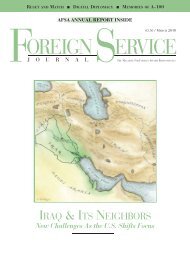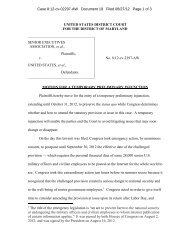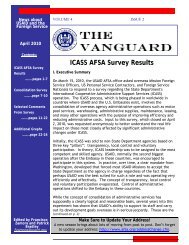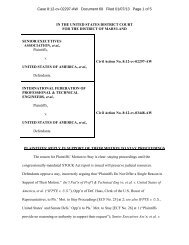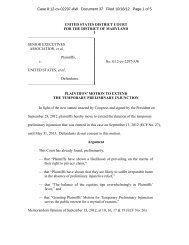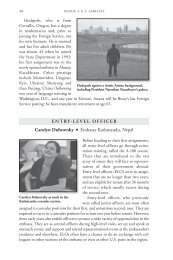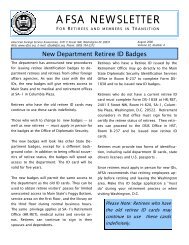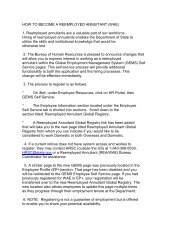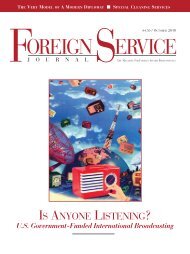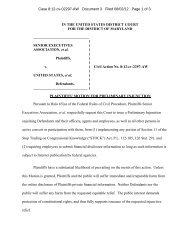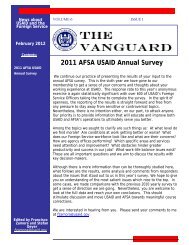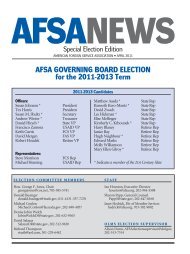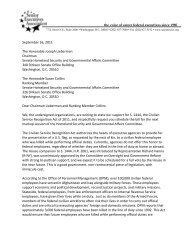F OCUS - American Foreign Service Association
F OCUS - American Foreign Service Association
F OCUS - American Foreign Service Association
You also want an ePaper? Increase the reach of your titles
YUMPU automatically turns print PDFs into web optimized ePapers that Google loves.
CYBERNOTES<br />
New Focus on Public Diplomacy<br />
PD, a new magazine and the first to<br />
focus exclusively on public diplomacy,<br />
was released by the <strong>Association</strong> of Public<br />
Diplomacy Scholars at the University<br />
of Southern California in February<br />
(www.publicdiplomacymagazine.<br />
com). Edited by graduate students,<br />
PD is published with support from the<br />
Center on Public Diplomacy and the<br />
School of International Relations at<br />
USC. It will appear biannually, with an<br />
accompanying webzine.<br />
The opening issue — “New President,<br />
New Public Diplomacy?” — includes<br />
memos and suggestions for<br />
President Barack Obama; an interview<br />
with former Under Secretary of State<br />
for Public Diplomacy and Public Affairs<br />
James K. Glassman; a case study<br />
on the 2008 Beijing Olympics and<br />
whether or not they fulfilled Chinese<br />
PD goals; and a review of Ambassador<br />
Edward P. Djerejian’s new book, Danger<br />
and Opportunity, an evaluation of<br />
U.S. diplomacy and public diplomacy<br />
efforts in the Middle East.<br />
50 Years Ago...<br />
“Because of the transformation of<br />
the world through communications and<br />
through democratization, publics have<br />
an increasingly significant role in the<br />
foreign policy process,” says Nicholas<br />
Cull, director of the Master of Public<br />
Diplomacy program at USC. “This<br />
magazine is a way of conceptualizing<br />
and documenting these changes”<br />
(www.usc.edu/uscnews/stories/16<br />
327.html).<br />
— Elizabeth Swift, AFSA Intern<br />
Undermining the Civilian<br />
Peacebuilding Initiative?<br />
Despite calls by senior military officials<br />
to demilitarize U.S. foreign policy,<br />
and a 2008 funding appropriation to<br />
the State Department to build the<br />
planned Civilian Response Corps, the<br />
Defense Department has announced it<br />
is forming its own deployable corps of<br />
civilians. Whether the Pentagon is setting<br />
an example or throwing a spanner<br />
in the works of rebalancing the military-civilian<br />
presence abroad is a topic<br />
of debate.<br />
What is the great difference between “substantive” and<br />
“administrative” work? Why is it that our officers try<br />
to avoid administrative work? My contention is that administrative<br />
experience is essential to an officer who aspires to become a<br />
principal officer or a deputy chief of mission, or, for that matter, to attain a<br />
key position in any embassy.<br />
— Glenn G. Wolfe, “Administration Is Substantive Work,” FSJ, April 1959.<br />
DOD Directive 1404.10, signed by<br />
Deputy Defense Secretary Gordon<br />
England on Jan. 23, directs the Pentagon<br />
to begin organizing, training and<br />
equipping an “expeditionary work<br />
force” of volunteers from among Defense<br />
Department civilian employees,<br />
as well as former and retired employees,<br />
to support humanitarian, reconstruction<br />
and combat support missions<br />
(www.dtic.mil/whs/directives/cor<br />
res/pdf/140410p.pdf).<br />
According to a report from the<br />
<strong>American</strong> Forces Press <strong>Service</strong>, the<br />
various DOD components will designate<br />
certain duty positions to participate<br />
in the program (http://smallwars<br />
journal.com/blog/2009/01/defense<br />
department-establishes/). Employees<br />
in those position will be asked to<br />
sign an agreement to deploy if called<br />
upon. Should an employee not wish to<br />
deploy, efforts will be made to reassign<br />
him or her to a nondeploying position.<br />
Employees in deployable positions<br />
will be trained, equipped and prepared<br />
to serve overseas on tours limited to<br />
two years. Further, volunteers will receive<br />
military medical support during<br />
their tours and their families will be<br />
supported and provided with information<br />
on benefits and entitlements.<br />
The Pentagon has been moving toward<br />
this program for months as part<br />
of an effort to fully utilize its civilian<br />
work force, as a Federal Times interview<br />
with Patricia Bradshaw, under secretary<br />
of Defense for civilian personnel<br />
10 F O R E I G N S E R V I C E J O U R N A L / A P R I L 2 0 0 9



